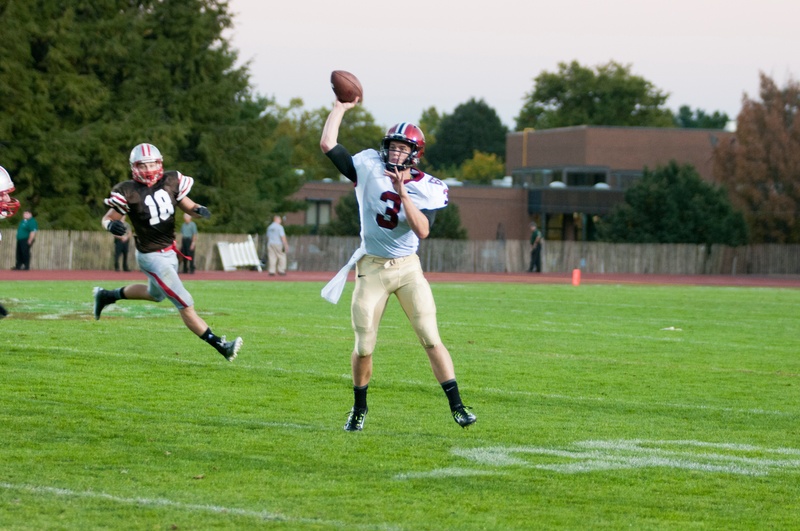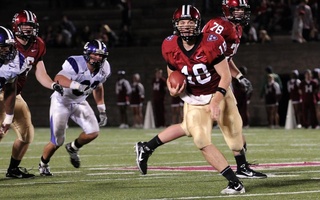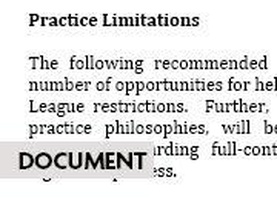
Junior quarterback Scott Hosch started his first game Saturday, tossing for 234 yards and a score in a win against Brown.
The whistle blew. The flag flew. The crowd booed. And booed.
That’s the story. But what happened?
Well, maybe nothing. If you consider a football game to be the attempts of two opposing teams to get a brown oval across their respective goal lines, then nothing happened during a stretch of several seconds late in Harvard’s battle with Brown Saturday.
But if football means referees and crowds and television and storylines too, then that moment with just over four minutes remaining might have been the biggest of the night.
Back judge Steve Toal’s helmet-to-helmet targeting call on Brown linebacker Michael Walsh gave Harvard a first down after it appeared the Crimson had been stopped two yards short on third down. Harvard proceeded to march down the field, scoring a touchdown to go up 22-14 with just 2:07 left.
During the drive, Walsh threw down his helmet and tossed his gloves, having been ejected for the hit. That was all he could do. There is no defense for a questionable call. In the press conference after the game, Bears quarterback Marcus Fuller shook his head when the penalty was mentioned. That was all he could do as well.
You could call it a bang-bang play, but it wasn’t. It was a bang play—Fischer catching the ball and turning, Walsh lunging, Fischer bracing, bodies falling. Five years ago, it would have been good football. Saturday, it was a game-defining moment.
Those two perspectives I mentioned earlier? Really, they are both right. Football can be played by a bunch of guys on grass. But what has turned it into this country’s biggest sport is the lights, the stage, and the crowd. Normally those two realms exist independently, though they are layered on top of one another.
Everything else going on in a stadium gives the game its shape and amplifies its importance. But it’s not supposed to impinge on the central action.
When the teams watch game film this week, the referees’ call will not show up. To them and other football purists, the story of Saturday’s game might be the Brown linebacker not staying disciplined in his assignment, allowing junior running back Paul Stanton to bust free for a 43-yard touchdown on a crucial third-quarter third-down. Or maybe the dominating double-team block that allowed Scott Hosch to scamper in for the game’s final touchdown will be the defining moment in their eyes.
But in the stands, the call was the talk.
Modern college football is not just play. It’s part of a show. Everything going on inside the gates is part of that, and the list of actors includes more than just the players.
The referees who control the game become part of that show, particularly when they make a call like Toal’s. At a moment like that, the play gets pushed to the second stage in favor of another part of the show. The actual actions are less important than how the storyline progresses.
The reality of the play matters less than the result of it.
It felt like the 13,511 in attendance were robbed when someone wearing neither Crimson nor Brown impacted play at such a crucial moment. But really, everyone watching got just what he or she asked for. The football was not great in that instance, but the drama was unparalleled.
Read more in Sports
Athlete of the Week Runners-Up: Week of 9/21Recommended Articles
-
 Avoid The Ouchies!
Avoid The Ouchies! -
An Official ChangeCurrently, the National Football League is the only major professional sport organization that doesn’t pay its officials a salary.
-
 NOTEBOOK: Chapple Comes Through for Crimson
NOTEBOOK: Chapple Comes Through for Crimson -
Uncivil DisobedienceSome zealotry and fervor does a political system good.
-
Injured Yale Linebacker To be Released from HospitalYale linebacker Jesse Reising, who was injured during the fourth quarter of the Harvard-Yale football game on Saturday, is expected ...
-
 Ivy League Tightens Restrictions on Full-Contact Football Practices
Ivy League Tightens Restrictions on Full-Contact Football Practices













